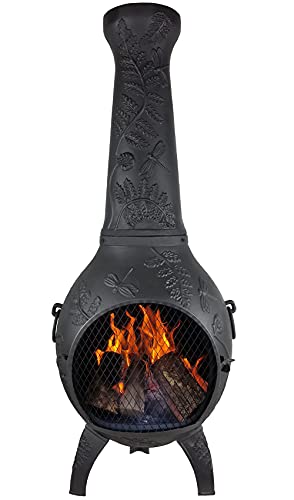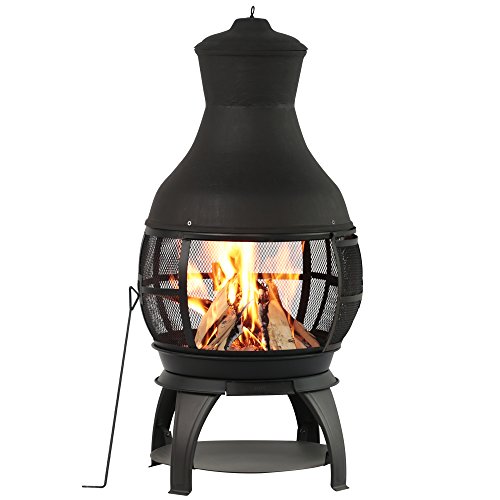Chimineas Vs Fire Pits
Similar to a pot-bellied stove,
chimineas sale have an opening in the front that is used for stacking fuel, and an attached chimney that draws smoke upwards. They can be found in a variety of materials, such as clay or terracotta to give the traditional appearance and iron or cast iron for durability.

Clay models are fragile and require careful handling, whereas metal models can withstand higher temperatures and rougher handling. Both add warmth and ambiance to outdoor spaces.
Chimineas
Chimineas, which are comparable to fireplaces on many levels, are made for outdoor use. They provide an appealing appearance. They are usually made of clay or terra-cotta, and are often decorated with themes inspired by
mexican chimineas culture. Modern chimineas are made of materials such as
cast iron chiminea iron and aluminium which are more resistant to breakage and damage than clay.
The chiminea was originally a potbellied fire, was developed in Mexico and the Western states. While they are primarily used for entertainment purposes they are a stunning addition to any outdoor space, and can also be an accent piece that can be incorporated into rustic décor. Chiminesas with long chimneys can draw smoke upwards, which helps to keep it away from people who are sitting near it, as opposed to fire pits, which usually contain an open flame that could create sparks and embers that can spread over the ground and surrounding areas.
Both chimineas and fire pits add warmth to outdoor spaces, but they have different advantages and requirements for maintenance. The style of a Chiminea can be adjusted to different styles of garden while the minimalist, sleek design of fire pits is ideal for a variety of outdoor spaces.
The difference in maintenance for chimineas versus fire pits is largely due to the materials employed. Terra clay, terra cotta and cast iron are more vulnerable to deterioration. Consequently, chimineas require more frequent maintenance.
Both kinds of outdoor fire features are popular for creating a cozy and inviting space to gather with family and friends for drinks or dinners. The enclosed and contained design of a chiminea makes it more suitable for smaller gatherings and can be more effective in warming up the space. The
chiminea outdoor fireplace's safety benefits come from the fact that the embers and sparks that fly off the fire are better contained. Fire pits must be placed with care to reduce the risk of fire and should be monitored.
Fire pits
When you are planning an outdoor space, you may be faced with the decision of whether to include the fire pit or chiminea. Both add warmth and elegance to a garden or patio but they differ in their design, operation, and security features. We'll help you choose the right option for your space by comparing the initial costs, maintenance, fuel costs, and more. We'll also evaluate the output of heat, smoke, and safety.
A chiminea or chimenea (pronounced che-mehn-ee-yah) is an open-air fireplace that comes with a chimney and can be used to cook in. They can be made from clay, metals like cast iron or steel, or cement or stone. They are available in various designs, shapes and sizes, providing flexibility to match different outdoor decors. Based on the material they are made of, they can be insulated for added comfort and a more contained flame, which helps to reduce the chance of sparks flying off and ensures safe operation.
Although chimineas can be used with wood and charcoal however, it is recommended to use seasoned logs or kiln-dried logs. Moisture wood generates more smoke and is also not heated as efficiently. Chimineas require a larger fire to keep warm, which could result in more smoke. This can be minimized by using a log grates, ensuring proper airflow, and maintaining the chiminea.
Steel is the most sought-after material for fire pits due to its cost and long-lasting. Some are portable, and others are designed to be permanent fixtures in an area. They are usually built into the ground, or on a raised platform, and come in a variety of designs, sizes and colors that match a wide range of outdoor decors. Gas is an option, because it is convenient and provides control. Wood and charcoal are also options.
While they can be easier to maintain than chimineas, fire pits are generally considered to be more dangerous than chimineas. The open design of fire pits can cause more sparks to fly which can be hazardous for pets and children. They require careful placement away from objects that ignite and constant supervision to avoid unwanted accidents. They also create lots of smoke and ash which could make them uncomfortable for certain people to sit near.

Safety
Both chimineas and fire pits can add warmth and charm to outdoor spaces However, their use is not without its risks. Both are extremely hot, and care should always be taken when operating them, especially in the presence of animals and children. Both can be used on surfaces that are susceptible to cracking when heated (see below), so placing a layer of sand in your chiminea or a stone slab and brick underneath the fire pit is recommended. Both can also release a considerable amount of smoke, which can be a problem if you live in a windy location. The chiminea is less susceptible to embers blowing from the wind and ash around since the fire is contained within. The opening is only one-sided and it is not possible to see the back, so it is easy to leave the chiminea alone in the event of a strong wind.
It is important to use only seasoned dry and kiln-dried logs for all types of fireplaces because they burn more efficiently and produce less smoke. Be sure to stay clear of flammable items like paper, twigs and rubbish that could quickly erupt into flames and trigger an unwelcome or potentially dangerous reaction.
Be aware of any local burning bans. They could be caused by weather conditions that combine with high emissions to increase levels of fine particulate matter pollution to unhealthy levels. Inhaling these harmful toxins could cause respiratory issues.
Be sure to keep a bucket of water or garden hose handy in case the fire grows out of control. Also, make sure that the area surrounding the fire pits & chimineas (
wiki.team-glisto.com) pit is free of branches, twigs and leaves that could easily catch fire. It's also recommended to keep a small first aid kit close to the fire pit in case someone is injured by sparks and smoke. Chimineas and fire pit will last for many years when they are properly cared for. However, clay and terracotta are more fragile than metal and may crack at high temperatures, so a cast iron fire pit or chiminea are the best choice for a hard-wearing addition to your patio.
Maintenance
If you do not properly maintain your chiminea or fire pit, in your backyard, it could pose serious dangers. It can cause serious damage or injury if it is used incorrectly or placed too close to a home or shrub, or other structures. It is crucial to ensure that only natural materials such as wood are burned and that no trash, plastics or liquid fuels are allowed to be utilized. Check your local weather forecasts to find guidelines on when you can burn. Finally, it is recommended to keep a fire hose or extinguisher within reach in case of emergency.
A chiminea is a traditional outdoor wood-burning fireplace, provides warmth and ambiance to gardens and patios. Made of clay, iron or cast iron, chimineas are available in a variety of designs and finishes. A lot of chimineas are ornate traditional designs that give a an authentic feel to the outdoor environment. Chimineas produce less smoke and emissions of particulate matter than fire pits, making them eco-friendly.
Cleaning your chiminea on a regular basis will keep it in top condition. Begin by removing any unburnt or ash from the inside of the grate. Next, make small fires with tiny pieces of wood that can be used as a kindling. Leave it to burn for about an hour then carefully dowse the flames with water to extinguish them completely. Then, wait for the chiminea's temperature to cool before making another fire with larger pieces of wood.
Chimineas can be a gorgeous addition to your outdoor space but they require more upkeep than fire pits. They must be cleaned frequently to avoid corrosion and other types of damage from the elements. Chimineas can be quite fragile, and can break or crack if they are not handled with care.
The decision to buy an chiminea or a fire pit, is ultimately based on your personal preferences as well as your budget. Both have advantages, but it's crucial to evaluate the initial investment and long-term expenses before deciding which one is best for your home. If you are looking for a longer-lasting solution, consider the custom-built chiminea, or fire pit constructed of durable materials such as steel or stone and is able to withstand the rigors of frequent use and harsh weather conditions.



